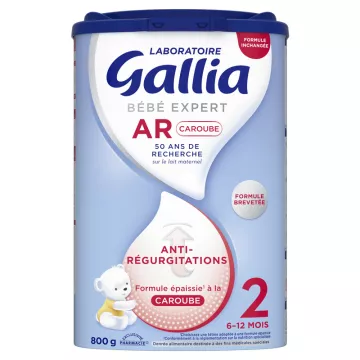Between 6 and 12 months, baby's needs change, as does his diet. At Soin-et-nature, you'll find a complete selection of follow-on milks, designed to support this pivotal period, either as a relay or as a complement to breastfeeding. Enriched with iron, essential fatty acids and vitamins, these follow-on milks support the development of the immune, cerebral and bone systems. Whether classic, thickened, hypoallergenic or organic, they adapt to the physiological needs of each child, while guaranteeing gentle digestion and optimal nutritional security.
More details
A genuine link between milk and solid food, 2nd age milk supports breastfeeding or first-age milk, as long as baby eats one full meal a day without milk. It meets the nutritional needs of babies aged between 6 and 12 months, but should never be offered before 4 months.
2nd age milk, or follow-on milk, is intended for infants from the age of 4 to 6 months. This baby milk accompanies the start of dietary diversification, providing your baby with all the nutrients he needs.
Pediatricians recommend switching to 2nd age milk when one meal is fully diversified. Don't worry if you still have some 1st age milk left and are starting to diversify. Finish your milk box and switch to 2nd age milk
2nd age milks differ little from 1st age milks. They also contain iron, vitamins and essential fatty acids. Their nutrients are more concentrated, except for lipids.
In recent years, the range of infant formulas has grown considerably, with the aim of being as close as possible to breast milk. Parents sometimes find themselves lost in this multitude of choices. All baby milks have their advantages and disadvantages, so don't change just like that. Your doctor, pediatrician or pharmacist can help and guide you in your choice.
It's important to remember that all these milks are subject to strict European directives. As a result, manufacturers can only vary the proportion of certain constituents according to what they want to favor.
2ᵉ âge milk is an infant formula that follows on from 1ᵉʳ âge milk or breastfeeding. It is intended for infants as soon as one of the meals of their day is fully diversified, i.e. without milk. However, it should never be offered before the age of 4 months, in line with pediatric recommendations.
This milk is formulated to cover the specific nutritional needs of growing babies, whose needs evolve with the introduction of new foods. It thus helps to provide a balanced intake of essential nutrients, while maintaining a milky base in the daily diet.
Although the composition of 2ᵉ age milks is similar to that of 1ᵉʳ age milks, adjustments are made to meet the nutritional requirements of babies in the diversification phase.
2ᵉ age milk contains an optimal concentration of vitamins and minerals, essential for growth:
Some 2ᵉ age milks include prebiotics and probiotics to promote a healthy gut microbiota, improve digestion and boost natural immune defenses.
2ᵉ âge milk is a key food in a well-balanced dietary diversification. Its benefits include:
The choice of 2ᵉ age milk depends on your baby's specific needs. Here are a few recommendations based on your child's particularities:
Soin-et-Nature offers a wide range of infant milks to meet the nutritional needs of infants and young children at every stage of their development. Here are the main categories available:
These infant milks available on Soin-et-Nature are designed to guarantee the safety and health of babies, while meeting strict quality and nutrition standards.